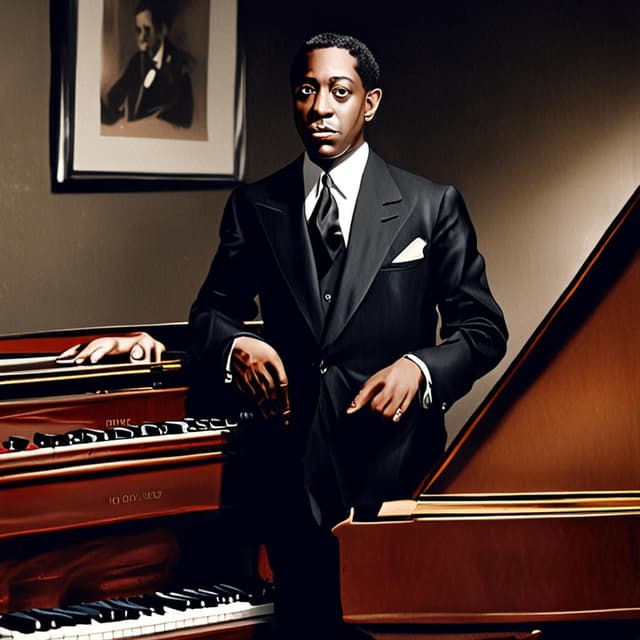
| Born | April 29, 1899 (died May 24, 1974) in Washington, D.C., U.S. |
| Name | Edward Kennedy 'Duke' Ellington |
| Career | Began in ragtime and vaudeville, transitioned to jazz in the 1920s, led his famous Orchestra for over six decades |
| Known for | Being one of the most influential and prolific figures in 20th century music |
| Occupation | Composer • Bandleader • Pianist |
| Musical style | Blended elements of jazz, classical, and popular music |
| Notable works | Composed thousands of innovative and ambitious compositions, from small-group pieces to full-scale symphonies |
Edward Kennedy "Duke" Ellington (1899-1974) was an American composer, bandleader, and pianist who is considered one of the most influential and versatile figures in 20th century music. Born and raised in Washington, D.C., Ellington led his famous Orchestra for over 50 years, composing thousands of works that blended elements of jazz, classical music, and popular music. His innovative musical style and ambitious compositions cemented his status as one of the greatest artists in American history.
Ellington was born in 1899 in Washington, D.C., the son of a White House butler and a pianist mother. He showed musical talent from a young age and received classical piano training as a child. Ellington was also exposed to the lively ragtime and vaudeville performance scenes in the nation's capital, which would later influence his signature style.
After briefly attending Armstrong Technical High School, Ellington left school to pursue a career as a ragtime pianist and bandleader in the 1920s. He quickly became a prominent figure in the thriving jazz scene of Washington, D.C., performing in local clubs and theaters. Ellington's early recordings with his band, the Washingtonians, helped establish his reputation as an innovative composer and arranger.
In the late 1920s, Ellington relocated his now-renamed Duke Ellington Orchestra to New York City, where they secured a residency at the legendary Cotton Club. It was during this period that Ellington began composing the ambitious, symphonic-scale works that would cement his legacy. Pieces like "Mood Indigo," "Sophisticated Lady," and "Solitude" incorporated elements of stride piano, blues, and classical music into a distinctive "Washington Sound" that quickly gained national attention.
Over the next several decades, Ellington led his flexible, tightly-disciplined Orchestra through countless groundbreaking recordings and live performances. He collaborated with a diverse array of artists, from traditional jazz soloists to pioneering bebop musicians, as well as European classical composers. Ellington's compositions became increasingly complex and visionary, incorporating elements of modernism, impressionism, and Third Stream fusion.
In the 1940s and 1950s, Ellington began expanding his musical vision even further, composing ambitious suites, tone poems, and even full-scale symphonies. Works like the Harlem, Black, Brown and Beige, and The River incorporated classical techniques and orchestration while retaining Ellington's distinctive jazz sensibilities.
Ellington's classical-influenced compositions earned him widespread critical acclaim, and he began collaborating with European composers like Darius Milhaud and Maurice Ravel. These cross-pollinations between jazz and European art music further cemented Ellington's reputation as one of the most versatile and forward-thinking composers of his era.
Duke Ellington remained actively performing and composing well into the 1970s, influencing generations of musicians across multiple genres. His sophisticated, emotive style, combined with his tireless work ethic and innovative spirit, made him one of the most revered and dominant figures in 20th century American music.
Beyond his artistic achievements, Ellington was also a pioneering advocate for racial equality and the recognition of African-American culture. He used his platform to champion the work of Black composers, arrangers, and instrumentalists, helping to break down barriers in the historically segregated music industry.
Duke Ellington's enormous body of work, spanning over 50 years, is a testament to his unparalleled creativity and mastery of his craft. He is now considered one of the greatest composers in any genre, with a lasting impact that extends far beyond the realm of jazz. Ellington's singular vision and enduring influence have cemented his legacy as one of the most important artists in American history.